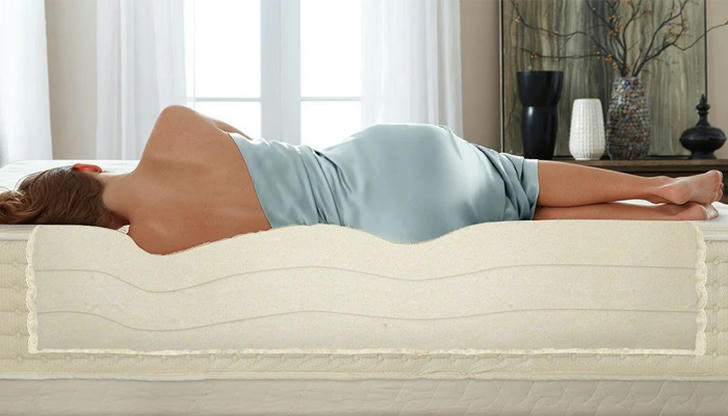Sleep Soundly: How to Find A Perfect Mattress

Waking up feeling sore? It might be time to replace your mattress. Picking the right one can make a world of difference for your sleep quality. Dr. Josh Tal, a sleep and health psychotherapist, emphasizes that the key is to reduce discomfort to help you stay asleep.
If you can't recall the last time you bought a new mattress, it's probably overdue. According to Dr. Vaishnavi Kundel, a professor at Mount Sinai, mattresses generally last about 10 years. Noticing sagging? That can cause uneven spinal support, leading to pain and restless sleep. Time to consider a change.
With that in mind, we spoke with experts to gather tips on choosing the best mattress for you. Here's what you need to know, whether you're leaning toward the convenience of a mattress-in-a-box or planning to visit a store.
Choosing the Best Mattress for Your Sleep Position

Side Sleepers
For side sleepers, a mattress that eases pressure on the shoulders and hips is ideal. Soft to medium-firm mattresses are best as they allow these areas to sink in, keeping the spine aligned and preventing pain.
Back Sleepers
Back sleepers should opt for medium to firm mattresses to ensure proper spinal support. A soft mattress can cause the spine to misalign, leading to back problems.
Stomach Sleepers
Stomach sleepers, like back sleepers, need a firmer mattress to keep the spine straight. A mattress that's too soft can cause the spine to sink, leading to misalignment and discomfort.
Combination Sleepers
If you switch between different positions, you'll need a mattress that accommodates all. A medium-firm hybrid mattress, like the Leesa Legend Hybrid, can offer the right mix of support and comfort.
Choosing the Best Mattress for Your Body Type
Your body weight is crucial when selecting a mattress. While your sleep position is important, adjusting the mattress firmness based on your size is equally vital.
David Rubin, a product testing director at The Sleep Doctor, recommends firmer mattresses for those over 230 pounds and softer ones for lighter sleepers. Heavier individuals should look for durable options like hybrid or innerspring mattresses to avoid sagging.
Dr. Nicholas R. Beatty from the Hospital for Special Surgery agrees, noting that lighter individuals might prefer medium-firm foam mattresses, while heavier ones may need firmer support with a softer top layer for comfort. Mattresses designed for heavier individuals, like the Big Fig mattress, can provide the necessary support.
Choosing the Best Mattress for Back Pain

Back pain can have many causes, making it tricky to attribute solely to your mattress. Dr. Beatty suggests a medium-firm mattress for most back pain sufferers. He also advises avoiding stomach sleeping, or using a pillow under the pelvis to reduce back extension. Aim for a position that keeps your spine aligned, and avoid too many pillows that can misalign your neck.
Choosing the Best Mattress for Hot Sleepers
If you tend to sleep hot, temperature regulation is key. Dr. Beatty recommends considering the room temperature and climate in your decision.
Hot sleepers should steer clear of traditional memory foam, which retains heat. Look for foam mattresses with features like perforated layers or phase-change materials that wick away heat. Innerspring or firmer mattresses can also help keep you cool by allowing better air circulation.
Understanding Different Types of Mattresses

Foam
Foam mattresses, made from memory foam or polyurethane, are known for their ability to cradle the body and relieve pressure points. They excel at motion isolation, making them a good choice for couples. However, they can retain heat, so look for cooling options if you're a hot sleeper.
Innerspring
Innerspring mattresses feature coils that offer varying levels of support. Pocketed coils, where each coil is individually wrapped, reduce motion transfer but may cost more. Innerspring mattresses provide firmer support and are less likely to cause you to sink in, which some people prefer.
Latex
Latex mattresses, made from natural or synthetic latex, offer a buoyant feel and conform to the body without the deep sink of memory foam. They are durable and provide good support.
Hybrid
Hybrid mattresses combine innerspring, foam, latex, or other materials to balance support and comfort. They are versatile and suit a range of sleepers, offering pressure relief without sacrificing support.
Adjustable
Adjustable mattresses can be customized to different angles for comfort and support using a remote or app. They're beneficial for conditions like acid reflux, snoring, or sleep apnea.
Firmness Levels
When shopping for a mattress, you'll encounter descriptions like firm, medium-firm, plush, or soft, sometimes accompanied by a firmness scale from 1 to 10. These ratings can vary between brands, so what one brand calls medium-firm might feel different from another.
Experts often suggest a medium-firm mattress for most people. To check if a mattress supports you well, especially if you're a side sleeper, try this: place a line of masking tape down your spine while standing straight. Lie on the mattress and have someone see if the tape stays straight. If it dips, the mattress isn't supportive enough.
How to Shop for a Mattress

Finding the Best Value
Mattress prices vary widely, from a few hundred to several thousand dollars. Larger sizes and additional features like cooling technology or zoned support increase the cost. Price doesn't always equal quality; it's about finding what meets your needs.
Consider Trial Periods and Return Policies
Look for generous trial periods and return policies, especially if buying online. Most brands recommend trying a mattress for at least 30 days before making a decision. Check for any fees associated with returns.
Understand Your Delivery Options
Retail stores often offer delivery and setup, while mattress-in-a-box options are delivered to your doorstep. Some online brands offer setup for an extra fee. If you choose doorstep delivery, be prepared to move the mattress yourself, which can be a challenge due to its weight.
What Size Mattress Do You Need?
Consider how many people (and pets) will share the bed and the space available. Here are standard mattress sizes:
Twin: 38 inches by 75 inches
Twin XL: 38 inches by 80 inches
Full/Double: 53 inches by 75 inches
Queen: 60 inches by 80 inches
King: 76 inches by 80 inches
California King: 72 inches by 84 inches
Choosing the right mattress can make a significant difference in your sleep quality and overall health. By considering your sleep position, body type, any specific needs like back pain or temperature regulation, and understanding the different types of mattresses, you'll be well on your way to finding the perfect fit.
